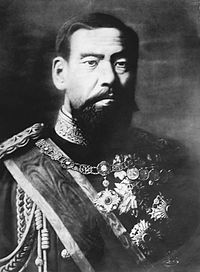Emperor Meiji Royalty
Emperor Meiji (明治天皇, Meiji-tennō, November 3, 1852 – July 30, 1912), or Meiji the Great (明治大帝, Meiji-taitei), was the 122nd Emperor of Japan according to the traditional order of succession, reigning from February 3, 1867 until his death on July 30, 1912. He presided over a time of rapid change in the Empire of Japan, as the nation quickly changed from a feudal state to a capitalist and imperial world power, characterized by Japan's industrial revolution.At the time of his birth in 1852, Japan was an isolated, pre-industrial, feudal country dominated by the Tokugawa Shogunate and the daimyo, who ruled over the country's more than 250 decentralized domains. By the time of his death in 1912, Japan had undergone a political, social, and industrial revolution at home (See Meiji Restoration) and emerged as one of the great powers on the world stage. The New York Times summed up this transformation at his funeral in 1912, with the words: "the contrast between that which preceded the funeral car and that which followed it was striking indeed. Before it went old Japan; after it came new Japan."In Japan, the reigning emperor is always referred to as "the Emperor", and since the modern era a deceased emperor is referred to by his particular reign name. The correct usage is thus "the Meiji Emperor". His personal name, which is not used in any formal or official context, was Mutsuhito (睦仁).
Personal facts

| Birth date | November 03, 1852 |
|---|---|
| Birth place | |
| Date of death | July 30, 1912 |
| Resting place | |
| Parents | Emperor Kōmei Nakayama Yoshiko |
| Spouse |
Search
Royalty
| From | 1867 |
|---|---|
| To | 1912 |
| predecessor | |
| successor |
Emperor Meiji on Wikipedia
External resources
- http://meijiemperor.net
- http://www.meijijingu.or.jp/english
- http://www.worldcat.org/title/emergence-of-meiji-japan/oclc/31515308&referer=brief_results
- http://www.worldcat.org/title/emperor-of-japan-meiji-and-his-world-1852-1912/oclc/46731178&referer=brief_results
- http://www.worldcat.org/title/modern-history-of-japan-from-tokugawa-times-to-the-present/oclc/49704795?referer=di&ht=edition
- http://www.worldcat.org/title/patriots-and-redeemers-in-japan-motives-in-the-meiji-restoration/oclc/23869701&referer=brief_results
- http://www.worldcat.org/title/sakamoto-ryoma-and-the-meiji-restoration/oclc/413111&referer=brief_results